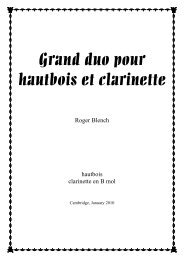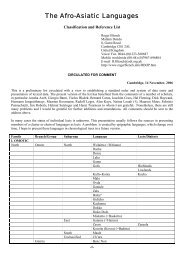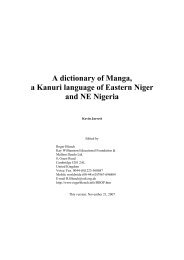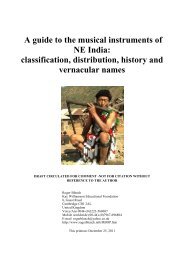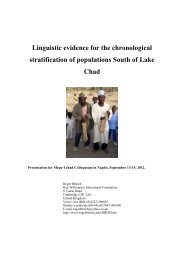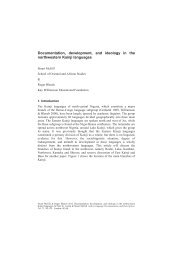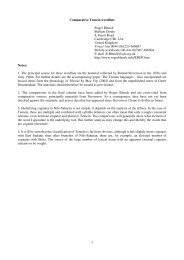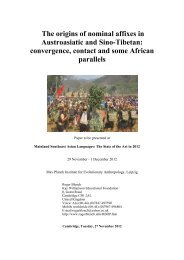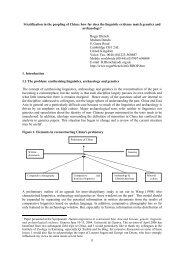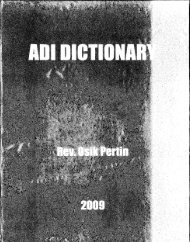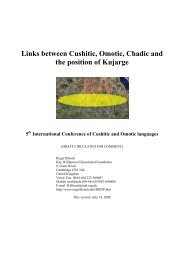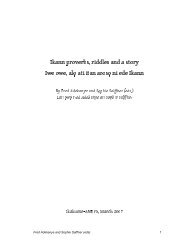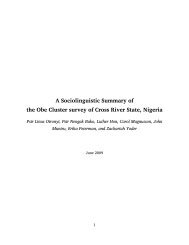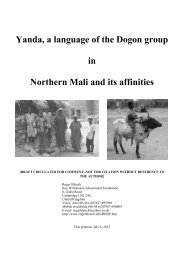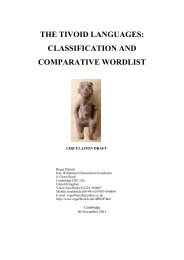Imperial grammar.pdf - Roger Blench
Imperial grammar.pdf - Roger Blench
Imperial grammar.pdf - Roger Blench
You also want an ePaper? Increase the reach of your titles
YUMPU automatically turns print PDFs into web optimized ePapers that Google loves.
<strong>Roger</strong> <strong>Blench</strong>: <strong>Imperial</strong> <strong>grammar</strong> and grassroots categories Circulation draft<br />
Related to this is the extent to which ideophones fall into multiple categories. The following sections suggest<br />
that we have rather glibly brought together different word types into a single class, in part because we don’t<br />
take this type of word very seriously, a not untypical view from a culture where orality is a receding memory.<br />
I therefore propose overarching term used in the Asian literature, ‘expressives’ to group together all words<br />
somehow expressive of sensory experience, reserving ‘ideophones’ for a more specific subtype such as<br />
sound-symbolism. Expressives will need to be subdivides much more subtly, according to what they ‘do’ in<br />
sentences and the type of experience to which they can be applied. This section thus passes lightly over the<br />
established types of ideophone in favour of some classes which are less well-known.<br />
The marginalisation of these word-classes of in our description of languages is really a statement about their<br />
impoverishment in our own. Listen to natural speech and it is rich in this type of word, as are stories,<br />
narratives, proverbs and other oral forms. Junod (1896:196-7), under Adverbes descriptifs, expresses this<br />
very well when he says ‘Il suffit d’avoir assisté à quelques conversations de noirs, dans la liberté de la<br />
nature, lorsqu’ils n’étaient sous aucune contrainte pour avoir remarqué quelle prodigieuse quantité<br />
d’expressions de ce genre ils ont à leur commande….Il réussit à rendre par ces mots-là des nuances qu’un<br />
langage plus posé saurait exprimer. To give them such cursory treatment in our language descriptions<br />
carries with it a burden of ethnocentricity.<br />
4.2 Ophresiology<br />
Many African languages have ophresaesthemes, words to describe very specific smells. A popular one in<br />
Nigeria/Cameroun is the ‘smell of fresh dogmeat’, admittedly not common in European contexts. These do<br />
not fill the same syntactic slot as ideophones and behave more like invariant nouns, as a complement to the<br />
verb ‘to smell’. Nonetheless they appear to fill the same experiential slot as ideophones. Table 8 shows a<br />
sample of ophresaesthemes in the Kuteb language, a Jukunoid language spoken south of Takum in<br />
southwest Nigeria, which has a rich inventory of such terms;<br />
Table 8. Kuteb odour terminology<br />
Kuteb<br />
Gloss<br />
nuŋ akoŋ ‘to produce a bad smell’ (generally)<br />
ashwáe ‘smell of fermented cassava, guinea corn sprouts’<br />
aság<br />
‘smell of fresh fish, raw dog meat’<br />
ará/arwá ‘smell of rotten eggs’<br />
kushiŋ ‘smell of soap or a dirty cloth’<br />
kusīnn ‘smell of a cobra or musk shrew’<br />
aŋham/kuŋham ‘smell of sour beer’<br />
kuyaŋ/kupí ‘smell of smoked meat, perfume’<br />
rika<br />
‘smell of frying palm kernels’<br />
aruwub ‘smell of rotting mushrooms’<br />
icwu/kucwu ‘smell of day-old porridge or of a dead body’<br />
rikpankwer ‘smell that causes discomfort’<br />
kubyinkũn ‘smell of concentrated palm wine’<br />
nyinyiŋ ‘a sharp, acidic smell’<br />
Source: Koops (2009)<br />
Kuteb has sound-symbolic ideophones which have more usual morphological characteristics, including<br />
reduplicated syllables, but clearly the ophresaesthemes do not have these characteristics. A similar inventory<br />
of terms also occurs in Tarok, a Plateau language spoken north of Kuteb (<strong>Blench</strong> & Longtau 1995) and in<br />
the Bantu languages of Gabon (Hombert 1992).<br />
4.3 Insultatives<br />
Across Central Nigeria, many Plateau and neighbouring languages have what may be called ‘insultatives’.<br />
These are invariant adjectives that qualify or refer to body parts, focusing on their shape. They could also be<br />
considered ‘body epithets’, although they are not idioms in the usual sense. These are only used in insults or<br />
jokes and can be considered mild or strongly insulting according the culture. They do not resemble<br />
6



